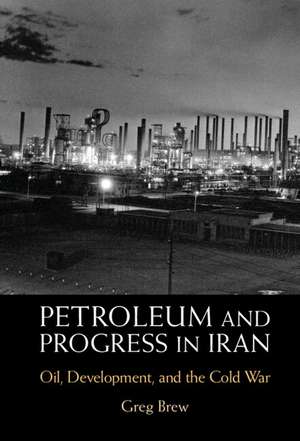Petroleum and Progress in Iran: Oil, Development, and the Cold War
Autor Gregory Brewen Limba Engleză Hardback – 21 dec 2022
Preț: 583.91 lei
Preț vechi: 656.07 lei
-11% Nou
Puncte Express: 876
Preț estimativ în valută:
111.73€ • 116.90$ • 92.82£
111.73€ • 116.90$ • 92.82£
Carte tipărită la comandă
Livrare economică 02-16 aprilie
Preluare comenzi: 021 569.72.76
Specificații
ISBN-13: 9781009206341
ISBN-10: 1009206346
Pagini: 261
Dimensiuni: 236 x 159 x 26 mm
Greutate: 0.56 kg
Editura: Cambridge University Press
Colecția Cambridge University Press
Locul publicării:Cambridge, United Kingdom
ISBN-10: 1009206346
Pagini: 261
Dimensiuni: 236 x 159 x 26 mm
Greutate: 0.56 kg
Editura: Cambridge University Press
Colecția Cambridge University Press
Locul publicării:Cambridge, United Kingdom
Cuprins
Introduction; 1. Iran, global oil, and the United States, 1901–1947; 2. 'We have done nothing': the Seven-Year Plan and the failure of dual integration in Iran, 1947–1951; 3. The Mosaddeq Challenge: nationalization and the isolation of Iranian oil, 1951–1952; 4. The collapse narrative: the coup and the reintegration of Iranian oil, 1952–1954; 5. The petrochemical paradise: oil-driven development and the Second Plan, 1954–1963; 6. The golden goose: Iran, the Consortium, and the first OPEC crisis, 1954–1965; 7. Controlled revolution: expertise, economics, and the American view of Iran, 1954–1965; Epilogue.
Recenzii
'This is not only a book about great power politics – Brew reveals in gripping detail how internal debates and US pressures over different planning and development strategies determined the oil and foreign policy of Iran. It includes an exciting 'revisionist' interpretation of Mossadegh's failed attempt to nationalise oil in the early 1950s.' Giuliano Garavini, Roma Tre University
'This book tells a compelling story based on impressive multilingual research. In this thoughtful and engaging book, Brew expertly illuminates the connections between US-Iranian relations, the twentieth-century global oil market, and Iranians' struggle to shape their country's economic future.' Victor McFarland, University of Missouri
'This is a deeply-researched and original study of American-Iranian relations told through the dual lenses of oil and Iranian development programs. Brew's use of Persian-language materials offers an exemplary model for future scholars. The book makes a significant contribution to the history of US-Iran relations, Cold War-era development, the Pahlavi petro-state, and the global oil industry.' Kelly Shannon, Florida Atlantic University
'In his fascinating, meticulously-researched book, Gregory Brew demonstrates how US development efforts during the Cold War shaped Iran's political and economic history, challenging grand narratives about US Cold War liberalism. This will be required reading for scholars of US foreign relations, Iranian history, petro-development and critical development studies.' Karine V. Walther, Georgetown University in Qatar
'This book tells a compelling story based on impressive multilingual research. In this thoughtful and engaging book, Brew expertly illuminates the connections between US-Iranian relations, the twentieth-century global oil market, and Iranians' struggle to shape their country's economic future.' Victor McFarland, University of Missouri
'This is a deeply-researched and original study of American-Iranian relations told through the dual lenses of oil and Iranian development programs. Brew's use of Persian-language materials offers an exemplary model for future scholars. The book makes a significant contribution to the history of US-Iran relations, Cold War-era development, the Pahlavi petro-state, and the global oil industry.' Kelly Shannon, Florida Atlantic University
'In his fascinating, meticulously-researched book, Gregory Brew demonstrates how US development efforts during the Cold War shaped Iran's political and economic history, challenging grand narratives about US Cold War liberalism. This will be required reading for scholars of US foreign relations, Iranian history, petro-development and critical development studies.' Karine V. Walther, Georgetown University in Qatar
Notă biografică
Descriere
Explores how oil companies, Western development NGOs, the US government, and Iranian technocrats turned Iran into the first 'petro-state'.
